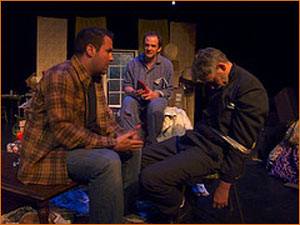
 |

I know that I’m not the first critic to see the influence of Harold Pinter and Sam Shepard on Lyle Kessler’s play Orphans. I know that because I read it in the New York Times review. And I’m surely not the first to see the influence of David Mamet: Orphans premiered in 1985 at Chicago’s Steppenwolf Theatre, Mamet’s theatrical home. American playwright Kessler’s debts to Mamet, as well as Pinter and Shepard, are so evident in the text as well as in Stephen Drover’s snappy and entertaining Wink Theatre production at the Firehall. Treat (Andrew McNee) and Philip (Michael Rinaldi) are brothers living in a disheveled house (nicely designed by Kerri Norris) in North Philadelphia. Their relationship, like those of the brothers in Pinter’s The Caretaker and The Homecoming, Shepard’s True West and Buried Child, is all about power. Manically violent big Treat goes out and steals and beats up people and brings home the bacon—or rather the cans of tuna and jars of Hellman’s mayonnaise—which little manically neurotic Philip, who stays at home watching TV and hiding in the closet, lives on. Treat dominates Philip by convincing him he’s allergic to the outdoors, and by keeping him illiterate. Everything changes when the ominous stranger enters—the ostensible object of a pathetically inept ransom scheme by Treat—and soon takes over the household. Harold (Michael Charrois) is a mysterious criminal of some kind who enlists the brothers as his protegés (cf. Mamet’s American Buffalo). He empathizes with them as “Dead End Kids” (a movie reference) and orphans like himself. But mainly he rebuilds Philip’s self-confidence and catalyzes a power shift in the household. Blustery Treat turns out to be the neediest of them all. The plot and relationships are a little too familiar and theatrically artificial, but Kessler’s dialogue and Drover’s pacing are nicely crisp and the performances are engaging. Rinaldi’s Philip is undoubtedly the star of the show, totally inhabiting the strange little brother with a lithe physicality and making his neurosis fully believable. McNee is very funny in the many variations he brings to Treat’s explosive temper, but the character is a little too inherently stagy to ever seem fully real. After a coarse-acting drunken entrance, Charrois does a nice job underplaying Harold’s mystery and threat. The virtually unknown Kessler is no Mamet or Shepard, and certainly no Pinter. But derivative as the play may be, these orphans are definitely worth a look. |
